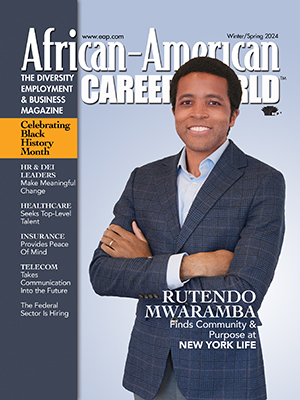| |

African-American Career World Magazine, launched in 2001, is the recruitment link between students and professionals who are African American and the employers that seek to hire them.
The publication includes career strategies, industry trends, and role-model profiles that target the African-American community.
This magazine reaches students, graduate students and professionals at their home addresses.
If you are an African-American college student or professional, African-American Career World is available to you FREE!

|
|
 African-American
African-American
Career World
» Featured Articles
» Subscription Information
» Reader Survey
» Companies Actively Recruiting

CONSIDERATIONS FOR YOUR NEXT CAREER CHANGE
Jerrell Moore
If you do a quick search on “career change,” you’ll see a multitude of self-help articles on interviewing, salary negotiations, relocating, and even Facebook etiquette. However, what does one do prior to engaging or embarking in the career search process? In my most recent career change, I spent time evaluating my professional wins and losses, my professional image with trusted peers, and created a game plan to ensure success in securing my next role. Here are a few tips on what worked for me:
Reflect. Whether it’s an internal promotion, external move, or even the move to entrepreneurship, you should take the time to really understand why you are looking for a change. Is it because you feel undervalued? Is it because you’re miscast in the wrong role? Are you underperforming? Are you bored? Or, do you have a great business idea that you’re ready to launch?
New York Times best-selling author Anthony Tjan writes in “Heart, Smarts, Guts, and Luck” that there is a “trinity of self awareness: know thyself, improve thyself, and complement thyself.” This is self-explanatory: work to improve yourself and surround yourself with people who will tell you the truth. This isn’t about proving why you should be able to change careers; it’s about understanding why you want to change careers. This should ultimately lead you to decide if you should change careers at any point.
Be aware. A Harvard Business Review blog post, “The Top Five Career Regrets,” by author Daniel Gulati reveals that “the effects of bad career decisions and disconfirmed expectancies were felt equally across age groups.”
Gulati’s research finds that most of those interviewed wish ed that they had acted on their hunch es: quit that job earlier, started that company sooner, not taken that job just for the money, and so on. Therefore, one can take what was gleaned from the self-reflection exercise and embrace the notion that a factbased decision will help avoid a regrettable career decision if acted upon correctly. So how does one act correctly?
Use GPS. “Seldom do people rise to successful positions who have not thought about how they will get there during their ascent,” writes Nick Inglis in the U.S. News & World Report article, “How to Map Your Career Path.” Determine industries of interest and assess your own strengths and weaknesses to develop a roadmap to your desired destination. Be it formal or self created, following an objective, written process is beneficial to getting to your next career destination.
Embrace fear and act. Career change can be so stressful and disruptive that many often avoid making the decision and stay in the (unpleasant) situation that caused them to start looking in the first place. Stanford University professors Jeffrey Pfeffer and Robert Sutton write in their book “The Knowing- Doing Gap: How Smart Companies Turn Knowledge in Action” that most suffer from a “knowing-doing” problem, which is an inability to convert what they know into action. Most high-achievers became that way by making few mistakes, which can often lead to inaction. In this case, embrace the fact that there is no “right way” to change careers and that your action will be more valuable than any plan you create that goes unexecuted. Do not become overwhelmed with career-change information overload; instead, learn by doing. Get out there and start exploring the market, interview if you have to instead of waiting on the “perfect job.”
Ultimately, you’re in the driver’s seat and even if your career change is unintended, you do have control over your professional destiny. With the right amount of planning and self-reflection, you’re destined to end up at your next destination.
 » Feedback for the Editor
» Feedback for the Editor
» Request Article Copy
|
|